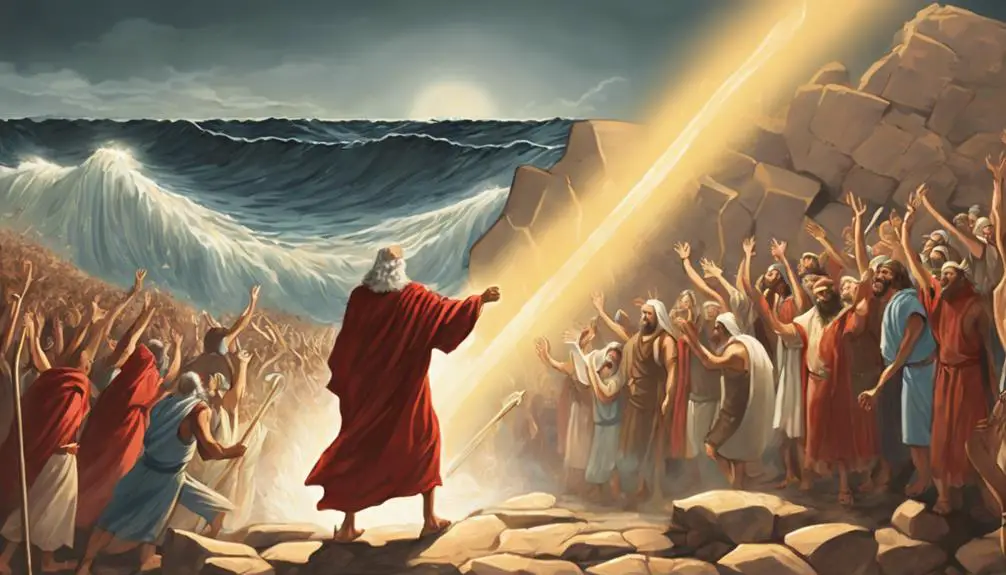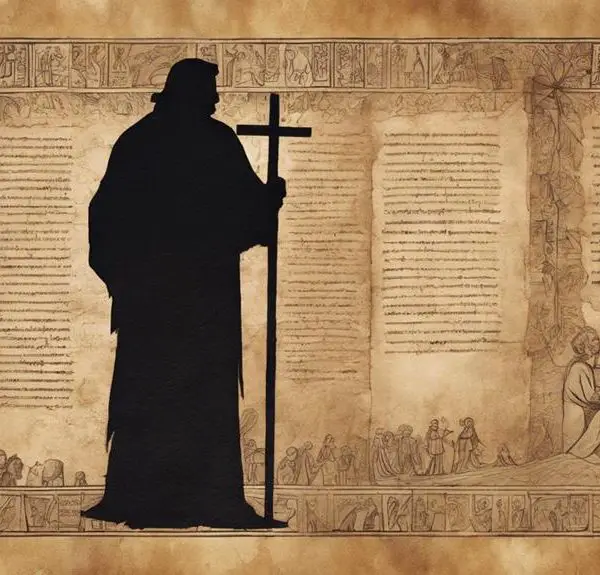Discover the profound stories behind 'M' names in the Bible, starting with 'J', and uncover hidden meanings that could transform your spiritual journey.

M Names in the Bible
As you navigate through the pages of the Bible, the names beginning with 'M' stand as beacons, illuminating paths of wisdom and virtue. You'll discover how Moses parted the Red Sea, symbolizing deliverance and law, and how Mary epitomized grace and compassion as the mother of Jesus.
Each 'M' name, from Miriam's strength and leadership to Matthew's faith and calling, and Malachi's prophecies of renewal, carries a unique legacy. But what deeper insights do these names hold, and how do they reflect on personal and spiritual growth?
This unexplored terrain beckons for a closer look, promising revelations that might just reshape your understanding of biblical narratives.
Key Takeaways
- M names symbolize leadership and divine calling, as seen in Moses and Matthew.
- Figures like Mary and Miriam highlight the importance of feminine strength and compassion.
- Spiritual renewal and the establishment of moral foundations are core to characters like Malachi and Moses.
- Themes of faith, forgiveness, and redemption are central to the stories of Matthew and Mary.
Moses: Deliverance and Law

Moses stands out as a pivotal figure in the Bible, leading the Israelites out of Egyptian bondage and establishing the foundation of their laws. His story is a testament to faith and obedience, marked by significant events that underscore his critical role in the narrative of the Israelites.
The burning bush episode is particularly noteworthy. Here, you're introduced to a moment of divine calling; Moses encounters God in the form of a burning bush that isn't consumed by fire. This event signifies his selection by God to deliver the Israelites from slavery, demonstrating the close communication between the divine and selected individuals in biblical narratives.
Following this divine encounter, Moses confronts Pharaoh, demanding the release of his people. This leads to the series of Egyptian plagues, a dramatic display of power meant to compel Pharaoh to free the Israelites. These plagues, ranging from rivers turning to blood to swarms of locusts, highlight the lengths to which God is willing to go for His people, as well as Moses' role as a mediator between the divine and the Israelites.
Throughout, Moses' story is one of unwavering faith and leadership, setting a significant precedent in biblical history.
Mary: Grace and Compassion
Mary's story, embodying grace and compassion, marks a profound pivot in biblical narratives, highlighting her central role in the life of Jesus and her unique position as a figure of maternal care and divine favor. Her representation in the scriptures serves as a multifaceted symbol of divine femininity and maternal symbolism, offering insights into the broader theological implications of her character. Here's an analytical exploration:
- Divine Femininity: Mary represents an intersection of human vulnerability and divine strength, illustrating the concept of divine femininity within a patriarchal narrative. Her unconditional acceptance of her role as the mother of Jesus showcases a powerful form of spiritual submission and strength.
- Maternal Symbolism: Through her, the Bible conveys profound maternal symbolism, portraying her as the epitome of nurturing love and compassion. Her presence brings a tender dimension to the narrative, emphasizing the importance of maternal care in spiritual and communal life.
- Grace and Compassion: Mary's interactions, especially her response to her unexpected pregnancy and her support at the crucifixion, reflect a deep reservoir of grace and compassion. These qualities not only define her character but also offer a model of unconditional love and forgiveness.
In analyzing Mary's story, you witness an emblem of grace, compassion, and divine femininity, presenting a compelling narrative of maternal symbolism within the biblical context.
Miriam: Strength and Leadership

Shifting focus from the emblem of divine femininity and compassion, we now explore Miriam's embodiment of strength and leadership within the biblical narrative. Miriam, the sister of Moses and Aaron, plays a pivotal role in the Exodus story, showcasing her leadership qualities and strategic thinking. Her musical legacy, most notably through the 'Song of the Sea,' not only celebrates the Israelites' escape from Egypt but also cements her position as a leader who uses art to inspire and unite her people.
Miriam's sibling dynamics reveal complex layers of her leadership style. She navigates her relationships with Moses and Aaron with a blend of assertiveness and collaboration, balancing her own vision with the needs and strengths of her brothers. This dynamic underscores her ability to lead alongside others, recognizing the importance of collective action and mutual support.
Her story also highlights the challenges faced by female leaders in biblical times and offers insights into how she overcame these obstacles. Miriam's resilience, wisdom, and ability to lead through both words and actions make her a compelling figure of strength and leadership in the Bible, providing a powerful example for future generations.
Matthew: Faith and Calling
In the narrative of the New Testament, Matthew exemplifies the profound transformation that faith and a sense of calling can instigate in an individual's life. Initially a tax collector, his life undergoes a radical change, illustrating the powerful impact of spiritual awakening. This tax collector transformation marks a pivotal moment in the disciple's journey, showcasing the transformative power of faith and calling.
To understand Matthew's transformation and his subsequent journey as a disciple, consider the following:
- Initial Encounter: Matthew's initial encounter with Jesus is a defining moment. Jesus' simple invitation, 'Follow me,' prompts an immediate response, highlighting the compelling nature of spiritual calling.
- Change of Identity: The transition from tax collector to disciple underscores a profound change of identity. Matthew's acceptance of Jesus' call signifies a willingness to leave behind his past and embrace a new purpose.
- Contribution to Gospel: Matthew's unique perspective as a former tax collector enriches his Gospel, offering insights into Jesus' teachings and the inclusivity of His message. His account emphasizes forgiveness, redemption, and the potential for personal transformation through faith.
Matthew's story is a testament to the transformative power of faith and the profound impact of answering one's calling.
Malachi: Prophecy and Renewal

Turning our focus to Malachi, we encounter a message of prophecy and renewal that challenges the community to reflect and reform. Malachi, whose name suggests 'My messenger' or 'Divine messenger,' serves as a pivotal figure addressing Israel during a time of spiritual complacency. He calls for a return to covenant fulfillment, urging the people and the priests to renew their commitment to God. His prophecies aren't merely warnings; they're also promises of a renewed relationship between God and His people if they heed the call to repentance.
Malachi's dialogue with the community emphasizes the importance of sincere worship and social justice, tying them directly to the blessings of covenant fulfillment. He warns of the consequences of neglecting these duties but also foretells the coming of a messenger who'll prepare the way for the Lord. This prophecy introduces the concept of a divine messenger who'll herald a new era of spiritual renewal and covenant realization.
Through Malachi's teachings, we're reminded of the continuous cycle of prophecy, repentance, and renewal within the community of faith. His message serves as a timeless call to examine our commitment to divine principles and to live out the covenant with integrity and faithfulness.
Frequently Asked Questions
How Do the Meanings of These Biblical M Names Influence Modern Naming Practices in Various Cultures?
When you look at modern trends analysis, it's clear that biblical names, including those starting with 'M', have a significant impact on naming practices across cultures. These names carry deep meanings, influencing choices due to their historical and spiritual significance.
Cultural adaptation mechanisms play a role in how these names evolve and integrate into various societies. Understanding this influence helps you appreciate the blend of tradition and personal identity in naming practices today.
Are There Any Lesser-Known Stories or Apocryphal Texts Involving Characters With M Names From the Bible?
You might think lesser-known stories or apocryphal texts lack impact, but they're rich in detail and context.
For instance, Methuselah's longevity isn't just a number; it symbolizes wisdom and the passage of time, influencing perceptions of age and experience.
Similarly, Magdalene's professions shed light on societal roles and redemption, offering a deeper understanding of character complexity.
These stories provide a nuanced analysis of themes that resonate across cultures and eras.
How Have Interpretations of These M Names From the Bible Evolved Over Time in Different Religious Denominations?
You'll find that interpretations of biblical figures like Moses and Mary have evolved distinctly across different religious denominations. Moses' leadership is often highlighted in Jewish teachings for its legal and ethical impacts, while Christian denominations may emphasize his prophetic role.
Similarly, Mary's virtue is universally acknowledged, yet her role varies greatly, from the mother of Jesus in Christianity to a revered but less central figure in other faiths. These perspectives reflect diverse theological and cultural lenses.
In What Ways Have Artists, Musicians, and Writers Been Inspired by the Figures Bearing These M Names in the Bible to Create Their Works?
You've seen how artists, musicians, and writers draw inspiration from historical figures to fuel their creativity. Musical compositions often reflect the depth and complexity of these figures' stories, while artistic depictions capture their essence in visual form.
This trend extends to biblical figures, where their narratives provide a rich tapestry for creative expression. Such works not only honor these individuals but also offer new perspectives and interpretations through the lens of contemporary art and music.
Can the Impact of These Biblical Figures With M Names on Societal Values and Ethical Teachings Be Traced Through History?
You can certainly trace the impact of these figures on societal values and ethical teachings through history. By applying modern leadership paradigms and psychological analysis methodologies, you'll find that their stories and teachings have shaped not only ancient societies but continue to influence our modern world.
Their examples of courage, faith, and wisdom have been analyzed and integrated into current ethical discussions, demonstrating a lasting legacy on how we view leadership and moral decisions today.
Conclusion
In exploring these biblical names, you've journeyed through a tapestry of virtues woven with threads of spiritual significance.
Moses, Mary, Miriam, Matthew, and Malachi aren't just names; they're beacons illuminating paths of righteousness, compassion, leadership, faith, and renewal.
Like stars in the firmament of faith, they guide seekers towards a deeper understanding of divine purpose.
Their stories, rich in symbolism and moral fiber, invite you to reflect on your own life's narrative in the light of their enduring legacies.



Sign up